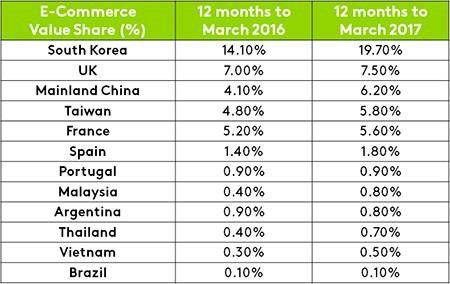 Economy
Economy

Việt Nam e-commerce, although small, is among the fastest growing globally, according to a report released by Kantar Worldpanel, a global expert in shoppers’ behaviour.
 |
| E-commerce percentage of FMCG online value share per markets, excluding fresh produce. - Photo Kantar Worldpanel |
HÀ NỘI - Việt Nam e-commerce, although small, is among the fastest growing globally, according to a report released by Kantar Worldpanel, a global expert in shoppers’ behaviour.
The report “The Future of E-commerce in FMCG” (fast moving consumer goods) is based on tracking the purchase of more than 500,000 shoppers in key countries spanning three continents.
In terms of absolute value growth, the top six contributors are all leading power economies, led by China and the United States.
The other top performing countries are South Korea, Britain, Japan and France.
However, the online grocery sector is also expanding into new markets. There has been significant value growth, for example, in Thailand (104 per cent), Malaysia (88 per cent), and Việt Nam (69 per cent), where e-commerce is in uts early stages.
In Việt Nam, the e-commerce channel has evolved thanks to booming internet usage and smartphone ownership, together with massive investment of key retail players. It now takes 0.5 per cent of the fast-moving consumer goods (FMCG) market in four key urban cities of Việt Nam, which are HCM City, Hà Nội, Đà Nẵng and Cần Thơ.
The percentage of e-commerce shoppers grew from 5.4 per cent to 8.8 per cent in four cities in the last year alone.
“Although the size of Việt Nam e-commerce market is still small compared to other formats, it holds a strong potential because the value growth of e-commerce within FMCG is up to 69 per cent,” said David Anjoubault, manager of Kantar Worldpanel Việt Nam. "This makes Việt Nam one of the countries with the highest e-commerce growth rate in the world,”
“It’s now the critical time for investors to enter this promising market. Current retail giants should gradually move their offers online and take advantage of their brand equity with omni-channel strategy to defend their current position. On the whole, consumer trust and high logistics cost for delivery model are major challenges that need to be addressed by businesses to move Việt Nam e-commerce forward,” he added.
The study showed that e-commerce now accounts for 4.6 per cent of all FMCG sales globally. While the e-commerce channel is growing, the FMCG market as a whole is sluggish, increasing just 1.3 per cent during the same period.
E-commerce now contributes to a record 36 per cent of global FMCG growth and will continue to outpace growth in offline FMCG retail.
“Our projections show that in 2025, online FMCG will become a US$170 billion-dollar business and hold a 10 per cent market share” says Stéphane Roger, global shopper and retail director at Kantar Worldpanel.
The big global uplift will come from the US, predicted to rise from a 1.5 per cent e-commerce share this year to 8 per cent in 2025.
South Korea and China will continue to lead the way and Asia in general remains at the cutting edge of online adoption.
Việt Nam e-commerce specifically, is expected to expand from 0.5 per cent to 2.2 per cent share in 2025 coupled with the rise of digitisation. — VNS




